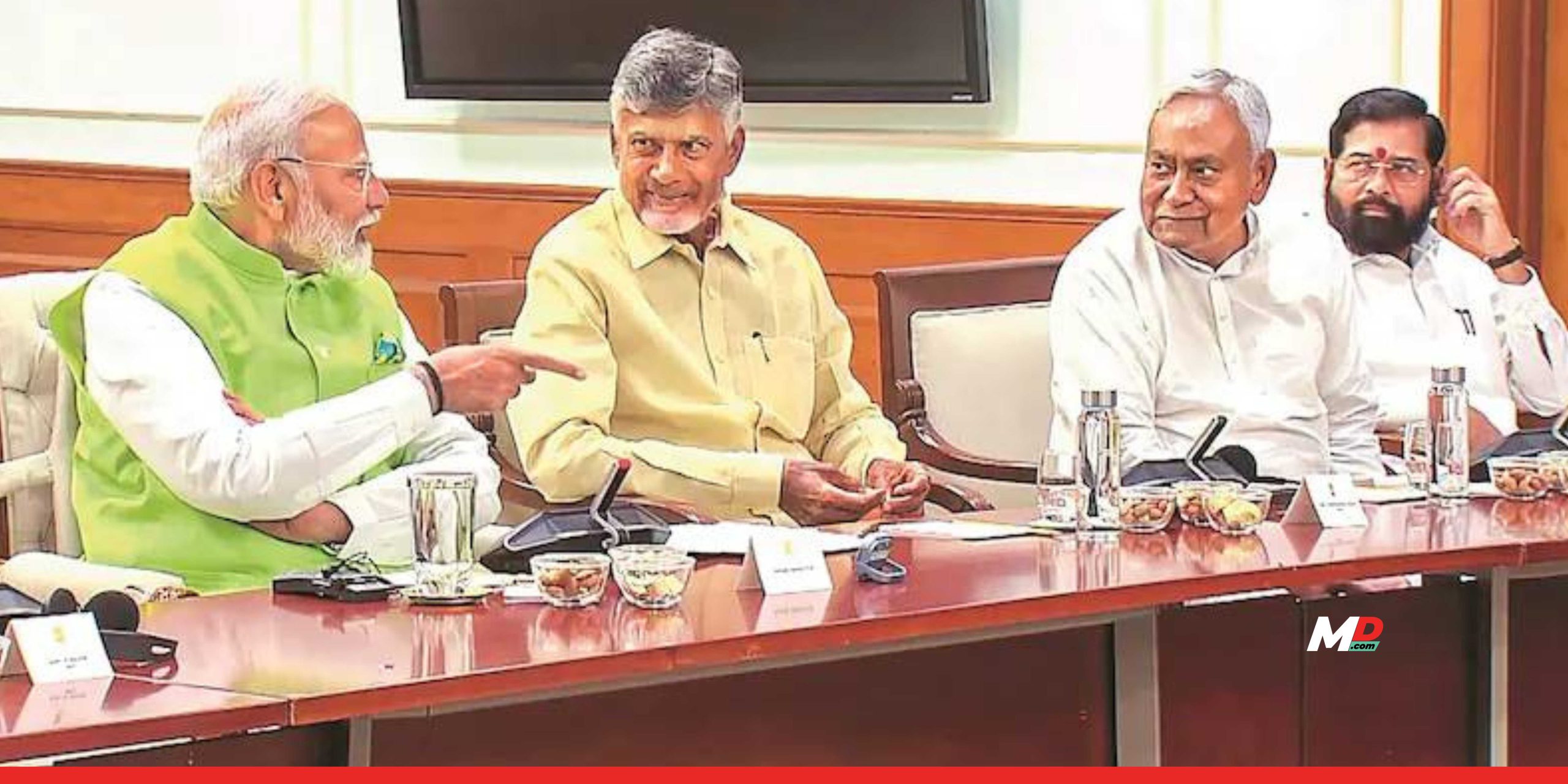Published
1 year agoon

The results of India’s recent Lok Sabha elections have sent shockwaves through the political landscape, with the ruling Bharatiya Janata Party (BJP) falling some way short of an outright majority. This unexpected outcome, which must sting as a defeat after claims of ‘400 paar’ earlier on, has set the stage for a new era of coalition politics, where the BJP’s allies in the National Democratic Alliance (NDA) have emerged as key power brokers.
As the dust settles, these coalition partners have wasted no time in flexing their muscles, engaging in a high-stakes game of negotiations to secure plum ministerial positions and shape the policy agenda of the incoming government. From the seasoned veterans like N. Chandrababu Naidu and Nitish Kumar to the rising stars like Eknath Shinde and Chirag Paswan, each party is jockeying for influence, determined to extract the maximum concessions from the BJP.
In the aftermath of the election results, the NDA allies have convened a series of meetings to coordinate their strategies and present a united front in their dealings with the BJP. According to reports, the demands being put forward by these coalition partners are nothing short of ambitious.
The TDP, led by N. Chandrababu Naidu, has emerged as a key player, having won 16 Lok Sabha seats and swept the Andhra Pradesh Assembly polls. Leveraging their newfound strength, the TDP is said to be demanding no less than five ministerial berths, including a coveted Minister of State position for the crucial Finance portfolio. Additionally, they are eyeing the prestigious Lok Sabha Speaker’s post, as well as important portfolios such as Roads, Panchayati Raj, Health, and Education.
The Janata Dal (United), led by Nitish Kumar, has secured 12 Lok Sabha seats and is now poised to extract its own pound of flesh. The party is reportedly seeking two Cabinet-level positions and one Minister of State role, with the Railways Ministry being a particularly high priority. Furthermore, the JD(U) is pushing for the establishment of a Common Minimum Programme for the new NDA government, as well as a coordination committee to ensure its effective implementation – a move that would give Nitish Kumar a direct say in the policy-making process.
The Janata Dal (Secular), led by HD Kumaraswamy, has won two Lok Sabha seats and is likely to demand a central ministerial role for its leader and MP. Given the party’s projection of itself as a champion of farmers’ interests, the Agriculture Ministry is believed to be a key target for the JD(S).
The BJP will also need to accommodate the Eknath Shinde-led Shiv Sena, which has won seven seats in Maharashtra, as well as Chirag Paswan’s Lok Janshakti Party, which has secured five seats. The potential involvement of actor-politician Pawan Kalyan’s Jana Sena, which has won two seats, remains to be seen.
The BJP’s inability to secure a majority on its own has shifted the balance of power within the NDA, empowering the coalition partners to assert their demands with greater force. With the BJP holding 240 seats – 32 short of the majority mark of 272 – the support of its allies becomes crucial in forming the next government.
Interestingly, the INDIA opposition bloc, comprising a diverse array of parties, has also managed to secure a respectable 232 seats, posing a formidable challenge to the BJP-led alliance. This has further strengthened the bargaining power of the NDA allies, who now find themselves in a position to potentially tilt the scales in favor of either the ruling coalition or the opposition.
The unfolding power struggle within the NDA has far-reaching implications for the future of India’s governance. As the BJP is forced to accommodate the demands of its allies, the policy agenda of the new government is likely to be shaped by a complex web of competing interests and priorities.
The push for a Common Minimum Programme and a coordination committee, as advocated by the JD(U), could introduce an unprecedented level of consensus-building and power-sharing within the NDA. This, in turn, could lead to a more inclusive and collaborative approach to policymaking, potentially tempering the BJP’s more ideologically-driven agenda.
At the same time, the scramble for ministerial berths and influential portfolios could result in a protracted negotiation process, potentially delaying the formation of the new government and the implementation of key reforms. The BJP’s ability to maintain a semblance of unity within the NDA will be crucial in navigating this delicate balancing act.
The events unfolding in the aftermath of the Lok Sabha elections serve as a stark reminder of the dynamic and ever-evolving nature of Indian politics. The BJP’s inability to secure an outright majority has upended the conventional wisdom that the party had cemented its dominance over the political landscape.
Instead, the rise of powerful regional players and the emergence of formidable opposition alliances have introduced a new level of complexity to the political equation. As the BJP scrambles to appease its allies and maintain its grip on power, it may be compelled to adopt a more moderate and consensus-driven approach, potentially tempering its more ideologically-driven agenda. This could have far-reaching consequences for the country’s social and economic policies, as well as its stance on key issues such as secularism, federalism, and the rights of marginalized communities.
Moreover, the rise of powerful regional parties and the formation of opposition alliances like the INDIA bloc suggest a growing desire among the electorate for a more decentralized and representative system of governance. The BJP’s inability to secure an outright majority may be a reflection of the public’s disenchantment with the party’s perceived authoritarian tendencies and its perceived neglect of regional aspirations.
As the political landscape continues to evolve, the ability of the BJP and its allies to navigate the complex web of coalition dynamics will be crucial in determining the future trajectory of Indian democracy. The delicate balance of power between the ruling coalition and the opposition, as well as the degree to which the NDA allies are able to shape the policy agenda, will be closely watched by the Indian public and the international community alike.


The Preliminary Findings of Air India AI171’s Tragic Crash Paint a Disturbing Picture


Japan’s Petabit Internet Is Faster Than You can Possibly Imagine


Cursed or Collectible? Labubu Dolls Likened to Ancient Demon


Elon Musk Launches ‘America Party’, But is it A Political Pipe Dream?


IPL 2025 Suspended As India-Pakistan Tensions Escalate


“We Will Make Them Pay If…”: Pakistan’s Aggressive Threats Spark Regional Tensions

